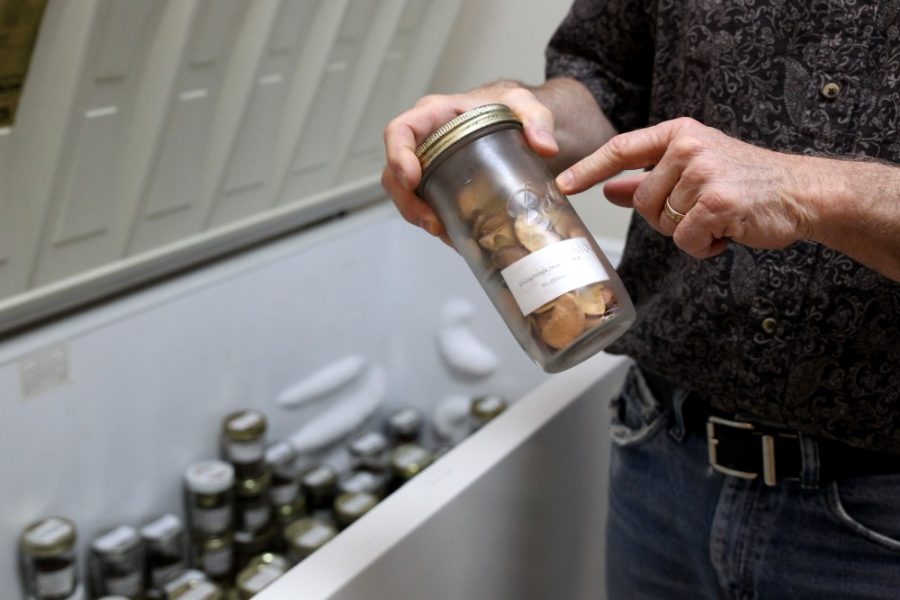Taking a walk in the desert, many Arizonans are accustomed to seeing mesquite bean trees with their yellow pods littering the ground around them. Some Arizonans may have even taken these pods and made flour from them, incorporating them into their baked goods.
But what most Arizonans do not know, is how important those crunchy little pods are for life in not just the desert, but arid environments around the world.
That’s where Matthew Johnson and the staff of the UA Desert Legume Program come in. Johnson, the program manager and curator of the program, and his team are ensuring that seeds from plants like the mesquite tree are preserved for generations to come.
Established in 1988 by R. Phillip Upchurch, an administrator in the College of Agriculture and Life Sciences, the DELEP has grown into the only wild legume seed bank of it’s kind and has expanded its reaches nationally and internationally.
“He really envisioned this as a program that would develop a comprehensive collection of seeds of plants in the pea or bean family, wild species as opposed to cultivated species, from dry regions all over the world,” Johnson said.
Johnson came to work for the program in 1988 part-time while finishing up his masters’ degree and he stepped into a full time role in 1989.
“It’s been fun. We started with nothing and now we have 3,900 individual collections,” Johnson said. “These are just shy of 1,400 species from 66 countries on 6 continents, so it’s a really international collection.”
The seed bank collection is housed in a brick building not far from the Campbell Agricultural Center. Inside, Johnson and his team work to archive and preserve the biodiversity of dry land legumes from all over the world. Seeds are also made readily available to those who may need them.
“We exchange seeds, we give seeds to people free of charge in Arizona, across the country and around the world,” Johnson said. “We get seeds likewise from people around the world. We actually buy stuff commercially; we’ve exchanged stuff with other botanical gardens, and we’ve had, in the past, contract collectors in Mexico and Zimbabwe that have collected for us.”
The seed collection of the DELEP is backed up by the National Seed Storage Laboratory in Fort Collins, Colorado. For any legumes in which they have 200 or more seeds, they will send seeds to be backed up at the national collection.
“Legumes are cool for a lot of reasons,” Johnson said. “They are second only to cereal grains in terms of their importance to humanity for nutrition.”
Seeds from DELEP are also backed up at the Svalbard Global Seed Vault in Norway. A former colleague’s daughter who was going to school in Norway at the time made their first delivery to the vault in Feb. 2011.
“We were only the third U.S. organization to have seeds placed in Svalbard,” Johnson said.
As a partner project between CALS and the Boyce Thompson Arboretum in Superior, Arizona, the DELEP has many ties with UA staff and the UA arboretum.
“Their [UA arboretum] director, Tanya Quist, is on our advisory panel for the Desert Legume Program as well,” said Mark Siegwarth, the executive director of the Boyce Thompson Arboretum.
Giant freezers around the building help to preserve the longevity of the seeds kept on site as well as keeps out vermin like seed weevils from decimating the seeds. Seeds in the freezer range from traditional Acacia tree bean pods that can be collected across Tucson to unusual seeds like mopani tree pod, which can be planted — pod and all — in sandy soil.
“I don’t know that I really have one [seed] that is most interesting because there are so many of them that are interesting,” Johnson said. “There are a few that are unusual for various reasons. There’s an African tree called the mopani tree which is actually quite important for some of the indigenous groups in parts of Africa. It has this kidney-shaped seed that is flat. It is really cool because it has a leaf that looks like a hoof-print of a cow and it’s a beautiful tree.”
With a staff of only three people working on the program in Tucson, volunteers are essential to helping clean and store the seeds and partners often help determine the importance and usability of some seeds store there
As the only seed bank that solely focuses on wild legumes, the DELEP is a special UA project that is keeping traditional legumes and peas alive in the wake of habitat loss and human encroachment.
Follow Natalie Robbins on Twitter.









